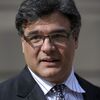Explosive packages were sent to Hillary Clinton, Barack Obama, and former Democratic National Committee chair Debbie Wasserman Schultz today and to billionaire Democratic Party donor George Soros over the weekend. None of them detonated and no one was injured. Why are incidents like this so common in the United States? The hosts look at the issue of political polarization, factional struggles among political elites and their impact on the larger population and the history and the role violence has played during periods of political turmoil and indeed within the foundational structures of what became the United States.
Wednesday's regular segment, Beyond Nuclear, is about nuclear issues, including weapons, energy, waste, and the future of nuclear technology in the United States. Kevin Kamps, the Radioactive Waste Watchdog at the organization Beyond Nuclear, producer of Loud & Clear Nicole Roussell, and Sputnik news analyst Walter Smolarek, join the show.
In our continuing daily coverage of the midterm elections, the hosts take a look at Medicaid. Medicaid expansion is on the ballot in some of the unlikeliest places this election, places like Idaho, Utah, Montana, and Nebraska. These are states whose populations were no fans of Obamacare, but many people there have come to the conclusion that the only way to cover gaps in health care is to expand the federal program long attacked by conservatives. Brian and John speak with Leo Cuello, an attorney and the director of health policy for the National Health Law Program.
The United Nations Undersecretary General for Humanitarian Affairs said yesterday that as many as 14 million Yemenis--half of the country's population--is at risk of starvation because of Saudi Arabia's war on that country. Mark Lowcock said, "There is a clear and present danger of an imminent and great famine" hitting Yemen that would be bigger than anything seen in the lifetime of any UN official. Kathy Kelly, co-coordinator of Voices for Creative Non-Violence, joins the show.
Ecuador's foreign minister said yesterday that the country would no longer intervene with the UK government on behalf of Wikileaks founder Julian Assange. Jose Valencia departed from previous policy by saying that it is now up to Assange to deal with his own problems with the UK. Randy Credico, an activist, a comedian, and the former director of the William Moses Kunstler Fund for Racial Justice, joins Brian and John.
Apple Corporation CEO Tim Cook launched a blistering attack yesterday in Brussels against what he called the data industrial complex. Cook said that the European Union's General Data Protection Regulation could provide an alternative model. Professor Bryan Ford, who leads the Decentralized/Distributed Systems lab at the Swiss Federal Institute of Technology in Lausanne (EPFL), joins the show.
Last week, there was an attack in southern Afghanistan against the governor, police chief, and intelligence director of Kandahar Province. They were all killed when the governor's own bodyguards opened fire. The attack was claimed by the Taliban. But now we're learning that the primary target was US Army General Scott Miller, the four-star officer in charge of all forces in Afghanistan. And US Army Brigadier General Jeff Smiley was shot and wounded in the attack. Brian and John speak with Brian Terrell, a long time peace activist and also co-coordinator of Voices for Creative Nonviolence.
We'd love to get your feedback at radio@sputniknews.com



